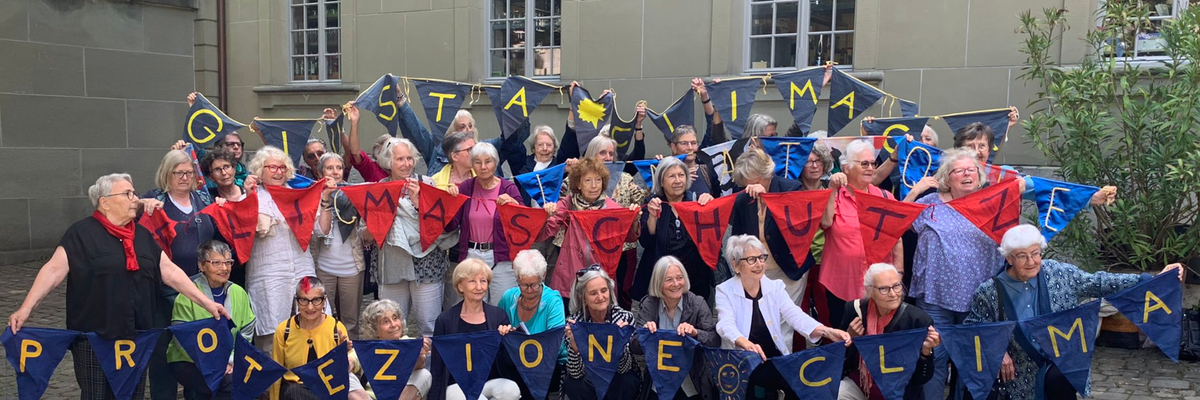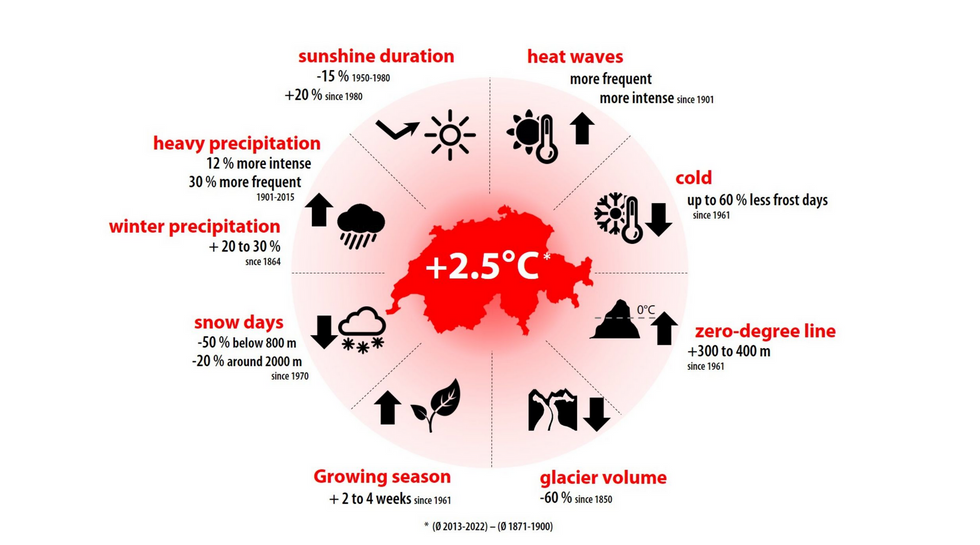

SUBSCRIBE TO OUR FREE NEWSLETTER
Daily news & progressive opinion—funded by the people, not the corporations—delivered straight to your inbox.
5
#000000
#FFFFFF
To donate by check, phone, or other method, see our More Ways to Give page.


Daily news & progressive opinion—funded by the people, not the corporations—delivered straight to your inbox.

Members of the Swiss group KlimaSeniorinnen pose for a photo on May 30, 2022.
"We are suing for our human right to life," said one 78-year-old plaintiff. "With this case, we want to help spur politicians into action a little bit."
The European Court of Human Rights on Wednesday heard arguments in a case brought by a group of elderly Swiss women who are suing their country's government, alleging that its "current climate targets and measures are not sufficient to limit global warming to a safe level."
Members of Senior Women for Climate Protection (KlimaSeniorinnen) and their attorneys appeared in the Strasbourg, France court for the tribunal's first-ever climate case. Outside the court, activists from the group and from other organizations including Greenpeace held banners and flowers and chanted "bravo" as each woman exited the building, according to SwissInfo.
"We are suing for our human right to life," Lore Zablonier, a 78-year-old from Zurich, told The Associated Press outside the court. "With this case, we want to help spur politicians into action a little bit."
\u201cThank you for supporting us \ud83d\ude0d\n\ud83d\ude4c\ud83d\ude4c\ud83d\ude4c\ud83d\ude4c\ud83d\ude4c\ud83d\ude4c\ud83d\ude4c\ud83d\ude4c\ud83d\ude4c\ud83d\ude4c\u201d— KlimaSeniorinnen (@KlimaSeniorinnen) 1680071319
As KlimaSeniorinnen's website explains:
Climate change already produces extensive damage. Menacing heatwaves, landslides, and floods will become the norm unless we take immediate action. Scientific insights notwithstanding, Switzerland along with most other countries is not doing as much as is necessary to avert such disasters. Because governments, through their inaction, violate basic rights, more and more people around the globe are taking them to court. What's at stake is a livable future—without climate collapse.
A growing number of climate-related cases are on the docket in courts around the world, from Australia to Sweden to the United States. The European Court of Human Rights will hear at least two more climate cases this year—one filed by a group of Portuguese youth and the other by a Green member of the European Parliament from France.
Switzerland is warming at a rate of more than twice the global mean. According to the Swiss Federal Office of Meteorology and Climatology:
The strong warming has an impact on many other climate indices in Switzerland. For instance, the zero-degree line has climbed substantially, which has resulted in Alpine glaciers losing over 60% of their volume since 1850. It is likely that they will no longer be part of the Alpine landscape by the end of this century. The vegetation period now lasts several weeks longer in the lowlands than it did even in the 1960s. Due to warming, precipitation now falls more often as rain than snow.
In 2021, Swiss voters narrowly rejected a government proposal to tax automobile fuel and airline tickets in a bid to help the country meet its targets under the Paris climate agreement. Switzerland is responsible for about 0.1% of global emissions.

A verdict in the suit filed by KlimaSeniorinnen is expected next year.
"Should we win... a better climate policy will help less the lives of senior people than those of our children and grandchildren," explained plaintiff Elisabeth Stern.
"Are we older women victims? Yes, in the sense of being personally affected and at increased health risk from increasing temperatures," Stern added. "But we are also highly competent agents of change. Because our climate complaint for the first time puts the European Court of Human Rights in the situation to comment on the climate protection measures of a member state. And on the question of whether climate action to protect citizens is a fundamental human right."
Dear Common Dreams reader, The U.S. is on a fast track to authoritarianism like nothing I've ever seen. Meanwhile, corporate news outlets are utterly capitulating to Trump, twisting their coverage to avoid drawing his ire while lining up to stuff cash in his pockets. That's why I believe that Common Dreams is doing the best and most consequential reporting that we've ever done. Our small but mighty team is a progressive reporting powerhouse, covering the news every day that the corporate media never will. Our mission has always been simple: To inform. To inspire. And to ignite change for the common good. Now here's the key piece that I want all our readers to understand: None of this would be possible without your financial support. That's not just some fundraising cliche. It's the absolute and literal truth. We don't accept corporate advertising and never will. We don't have a paywall because we don't think people should be blocked from critical news based on their ability to pay. Everything we do is funded by the donations of readers like you. Will you donate now to help power the nonprofit, independent reporting of Common Dreams? Thank you for being a vital member of our community. Together, we can keep independent journalism alive when it’s needed most. - Craig Brown, Co-founder |
The European Court of Human Rights on Wednesday heard arguments in a case brought by a group of elderly Swiss women who are suing their country's government, alleging that its "current climate targets and measures are not sufficient to limit global warming to a safe level."
Members of Senior Women for Climate Protection (KlimaSeniorinnen) and their attorneys appeared in the Strasbourg, France court for the tribunal's first-ever climate case. Outside the court, activists from the group and from other organizations including Greenpeace held banners and flowers and chanted "bravo" as each woman exited the building, according to SwissInfo.
"We are suing for our human right to life," Lore Zablonier, a 78-year-old from Zurich, told The Associated Press outside the court. "With this case, we want to help spur politicians into action a little bit."
\u201cThank you for supporting us \ud83d\ude0d\n\ud83d\ude4c\ud83d\ude4c\ud83d\ude4c\ud83d\ude4c\ud83d\ude4c\ud83d\ude4c\ud83d\ude4c\ud83d\ude4c\ud83d\ude4c\ud83d\ude4c\u201d— KlimaSeniorinnen (@KlimaSeniorinnen) 1680071319
As KlimaSeniorinnen's website explains:
Climate change already produces extensive damage. Menacing heatwaves, landslides, and floods will become the norm unless we take immediate action. Scientific insights notwithstanding, Switzerland along with most other countries is not doing as much as is necessary to avert such disasters. Because governments, through their inaction, violate basic rights, more and more people around the globe are taking them to court. What's at stake is a livable future—without climate collapse.
A growing number of climate-related cases are on the docket in courts around the world, from Australia to Sweden to the United States. The European Court of Human Rights will hear at least two more climate cases this year—one filed by a group of Portuguese youth and the other by a Green member of the European Parliament from France.
Switzerland is warming at a rate of more than twice the global mean. According to the Swiss Federal Office of Meteorology and Climatology:
The strong warming has an impact on many other climate indices in Switzerland. For instance, the zero-degree line has climbed substantially, which has resulted in Alpine glaciers losing over 60% of their volume since 1850. It is likely that they will no longer be part of the Alpine landscape by the end of this century. The vegetation period now lasts several weeks longer in the lowlands than it did even in the 1960s. Due to warming, precipitation now falls more often as rain than snow.
In 2021, Swiss voters narrowly rejected a government proposal to tax automobile fuel and airline tickets in a bid to help the country meet its targets under the Paris climate agreement. Switzerland is responsible for about 0.1% of global emissions.

A verdict in the suit filed by KlimaSeniorinnen is expected next year.
"Should we win... a better climate policy will help less the lives of senior people than those of our children and grandchildren," explained plaintiff Elisabeth Stern.
"Are we older women victims? Yes, in the sense of being personally affected and at increased health risk from increasing temperatures," Stern added. "But we are also highly competent agents of change. Because our climate complaint for the first time puts the European Court of Human Rights in the situation to comment on the climate protection measures of a member state. And on the question of whether climate action to protect citizens is a fundamental human right."
The European Court of Human Rights on Wednesday heard arguments in a case brought by a group of elderly Swiss women who are suing their country's government, alleging that its "current climate targets and measures are not sufficient to limit global warming to a safe level."
Members of Senior Women for Climate Protection (KlimaSeniorinnen) and their attorneys appeared in the Strasbourg, France court for the tribunal's first-ever climate case. Outside the court, activists from the group and from other organizations including Greenpeace held banners and flowers and chanted "bravo" as each woman exited the building, according to SwissInfo.
"We are suing for our human right to life," Lore Zablonier, a 78-year-old from Zurich, told The Associated Press outside the court. "With this case, we want to help spur politicians into action a little bit."
\u201cThank you for supporting us \ud83d\ude0d\n\ud83d\ude4c\ud83d\ude4c\ud83d\ude4c\ud83d\ude4c\ud83d\ude4c\ud83d\ude4c\ud83d\ude4c\ud83d\ude4c\ud83d\ude4c\ud83d\ude4c\u201d— KlimaSeniorinnen (@KlimaSeniorinnen) 1680071319
As KlimaSeniorinnen's website explains:
Climate change already produces extensive damage. Menacing heatwaves, landslides, and floods will become the norm unless we take immediate action. Scientific insights notwithstanding, Switzerland along with most other countries is not doing as much as is necessary to avert such disasters. Because governments, through their inaction, violate basic rights, more and more people around the globe are taking them to court. What's at stake is a livable future—without climate collapse.
A growing number of climate-related cases are on the docket in courts around the world, from Australia to Sweden to the United States. The European Court of Human Rights will hear at least two more climate cases this year—one filed by a group of Portuguese youth and the other by a Green member of the European Parliament from France.
Switzerland is warming at a rate of more than twice the global mean. According to the Swiss Federal Office of Meteorology and Climatology:
The strong warming has an impact on many other climate indices in Switzerland. For instance, the zero-degree line has climbed substantially, which has resulted in Alpine glaciers losing over 60% of their volume since 1850. It is likely that they will no longer be part of the Alpine landscape by the end of this century. The vegetation period now lasts several weeks longer in the lowlands than it did even in the 1960s. Due to warming, precipitation now falls more often as rain than snow.
In 2021, Swiss voters narrowly rejected a government proposal to tax automobile fuel and airline tickets in a bid to help the country meet its targets under the Paris climate agreement. Switzerland is responsible for about 0.1% of global emissions.

A verdict in the suit filed by KlimaSeniorinnen is expected next year.
"Should we win... a better climate policy will help less the lives of senior people than those of our children and grandchildren," explained plaintiff Elisabeth Stern.
"Are we older women victims? Yes, in the sense of being personally affected and at increased health risk from increasing temperatures," Stern added. "But we are also highly competent agents of change. Because our climate complaint for the first time puts the European Court of Human Rights in the situation to comment on the climate protection measures of a member state. And on the question of whether climate action to protect citizens is a fundamental human right."